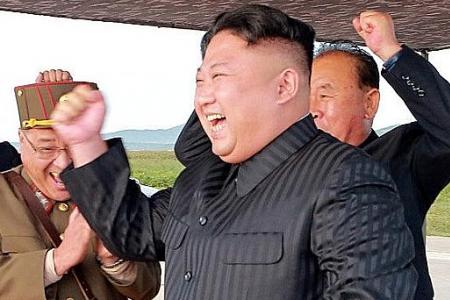The key is to contain North Korea
US should acknowledge that N. Korea is a nuclear state and focus on building an alliance to keep Pyongyang in check
Mr Donald Trump is just the latest United States president in a long list of commanders-in-chief who have failed to find a way to deal with North Korea.
In the 1960s and 1970s, the central goal was preventing North Korean founder Kim Il Sung from redeploying his army south of the 38th parallel.
For the last 25 years, however, the focus of US policymakers has been something even more difficult: the denuclearisation of the Kim dynasty.
Pyongyang's two intercontinental ballistic missile tests in July, its testing of a Hwasong-12 missile over Japan in August and the Sept 3 test of what Pyongyang claimed was a hydrogen bomb have only accelerated the sense of urgency in Washington, Seoul and Tokyo over the need for a strong collective response.
The US foreign policy community has many recommendations on the table but few easy answers. A preventive military strike is not plausible given its devastating cost - Brigadier-General Rob Givens (retired) estimates that 20,000 people would perish in Seoul on the first day of a conflict.
What may work, however, is a new US approach that learns from its failures - as well as its successes during the Cold War - while tempering expectations on what can be achieved.
The Kim dynasty has long sought recognition as a nuclear weapons state, a demand that would be a political minefield for even the most popular US president to meet. But North Korea is a nuclear state whether Washington offers formal recognition or not.
The only way for the US to improve its North Korea policy is by acknowledging that Pyongyang will be nuclear-capable for many years to come and is highly unlikely to eliminate its nuclear weapons programme regardless of what Washington offers.
This isn't about what Mr Kim Jong Un wants but rather what is most likely to serve US national security.
While openly recognising North Korea as a nuclear power would cause tremors throughout Asia, Mr Trump ought to do it anyway.
As soon as he does, the US can re-focus attention from a denuclearisation objective that is increasingly impossible to imagine towards an old-fashioned strategy of deterrence and containment.
For Washington, deterrence and containment would mean building an anti-North Korea alliance of diverse states in and outside the region with the common objective of minimising Pyongyang's ability to threaten its neighbours.
As politically risky as this decision would be, effective deterrence would require Mr Trump to establish a channel of communication with the North - similar to the US-Soviet and US-China hotlines during the Cold War - in order to clear up misunderstandings that will inevitably arise and to deliver a unified message of what Washington will tolerate.
The signal to the leadership in Pyongyang should be as unambiguous as possible; while Washington does not seek an armed conflict with the North, the US military will respond to any provocation that dangerously impacts the interests of the US or its allies.
Given Mr Kim's preoccupation with self-preservation - there is no evidence to date that he is bent on suicidal self-destruction - this arrangement may be pragmatic enough for the young dictator to explore.
While China remains resistant to cutting off all oil imports to the North or squeezing its economy to the point of collapse, Washington may be willing to enlist Beijing's help in areas where Beijing is more likely to agree, such as preventing the proliferation of dual-use nuclear and missile technology transiting North Korean territory.
Stemming the flow of these materials would minimise the spread of weapons of dangerous items to other proliferators, an objective that the Chinese appear to share.
Washington also needs to encourage a stronger South Korea-Japan relationship. Historical rivalries between these two countries cannot obstruct the regional intelligence sharing that is essential to promoting a unity of purpose in East Asia.
Washington can and should allow the South Koreans to take more responsibility for its external defence, but it can do so without giving Pyongyang a reason to believe that its nuclear development is causing divisions among its adversaries.
Conflict management is not the most ideal scenario for US policymakers, but it may be the only prudent choice they have left. - REUTERS
Daniel R. DePetris is a fellow at Defense Priorities.
Get The New Paper on your phone with the free TNP app. Download from the Apple App Store or Google Play Store now



